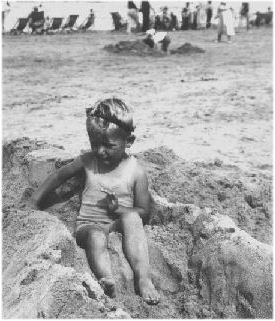
DEMONSTRATION
&
FREEDOM

Last week, "Xtinction" rebels occupied the IJmuiden sea locks. They were acquitted, citing freedom of demonstration. At the same time, a judge convicted a group of Christians. They challenged parents and school boards on the inappropriate , highly "inclusive" sex education in schools by another activist organization.
Considering the differences in judicial interpretation of rules regarding the freedom of demonstration, as mentioned at the outset, the legislature must provide clarity. The definition of what constitutes a demonstration must be revised, while maintaining the value of the right to demonstrate. Demonstration and action must be separated and better defined. I propose:
It brought back memories of a time when freedom was merely a pious wish. That began shortly after my parents took the above photo of their furious son. I'll tell that story at the end of this story. It has left a mark on my entire life.
Freedom is a precious commodity. We must continue to cherish it. Every commandment or prohibition is a restriction of personal freedom; even "you may not steal" or "you must keep to the right side of the road."
Therefore, restrictions on freedom are necessary. We justify them with "if your freedom means damage, injury, or obstruction to others." There's little disagreement about arguments for damage and injury, but when it comes to obstruction , it's a different story. Parties with different faiths can believe that the other's faith is an obstruction to them. Wars have been fought over this, science has been misled for a long time, and countless people have been harmed.
Thinkers who highlighted the importance of individual freedom and thereby gained almost the entire world's support have unleashed endless commentary. Commentary that primarily focused on the necessary limitations of absolute freedom. Anyone who gets involved in this without a careful study of the thoughts and findings of their predecessors has little right to speak. I won't venture into that.
What I do dare to do is express myself on a small aspect of highly valued individual freedom: freedom of demonstration. I'm no stranger to this. I've often demonstrated and organized demonstrations myself. During that time, I read extensively, gave lectures, and debated with prominent people who held different views. Nonviolent resistance was a frequent topic.
It can be divided into several stages.
It is free, provided it doesn't involve physical obstruction of others.
In my opinion, it would make a criminal verdict like the one handed down by the judge in the case of inclusive sex educators against Christians, who consider the culture under attack, impossible. Addressing school boards and parents is simply expressing ideas. While blocking roads and locks, just like preventing people from speaking, is physical. Sex education is even highly so. Animal rights activists would also lower their voice with that clarity, as would squatters of buildings. Actions, even those with banners, are different from expressing ideas. It often involves forcing, coercing, and effectively depriving or hindering other people of their freedom. Judges should look at this differently.
In the Netherlands, it seems likely that a sufficiently large majority would support such a change in legislation and regulations. The ANWB (Royal Dutch Touring Club) and Schiphol Airport would benefit, as would millions of others and, who knows, perhaps even an odd university administrator. So I would say:
For those who appreciate personal facts and aberrations, I owe an explanation for the photo of the angry little boy. It was taken in the last year the German occupiers permitted visits to the North Sea beaches. I was playing in the sand and in the sea. The sand in my wet swimsuit chafed. I took it off. That felt considerably better. My mother ran to me. I had to put the swimsuit back on. I didn't want to and asked, why? She explained that "the people" didn't want it. I looked around and, to my surprise, saw a beach packed with clothed people. Then, for the first time in my life, I realized that all those people were stupid and that I was the only one who had it right. It was an overwhelming thought. I immediately wondered, what other unpleasant matters were similar? It made me angry, because I realized I would never succeed in inspiring that crowd or standing up to them.
My mother told anyone who would listen that I spent an entire afternoon sulking angrily on a sand pile about that swimsuit. She was wrong. It undoubtedly played a role, but that wasn't what I agonized over for weeks. And what haunted me the rest of my life: the restriction of freedom and coercion imposed by a stupid superior force.
Years later, it led to a question of conscience when, together with Roel van Duin and Johanniek van der Molen, I organized the first Dutch protest against atmospheric nuclear testing. (About 25 pupils and students.) We didn't stand on the sidewalk with banners, but planned to block the intersection of Laan van Meerdervoort and Anna Paulownastraat early in the morning with a sit-in. After a long discussion, we reached an agreement. We would not resist, let ourselves be towed away, provide our identities, defend ourselves in court if necessary, accept the judge's verdict, and willingly submit to any punishment. That's how it went. Martin Luther King Jr. couldn't have done it better.
C. (Kees) le Pair
Nieuwegein, 2025 09 05.
| → top | → index |
|---|